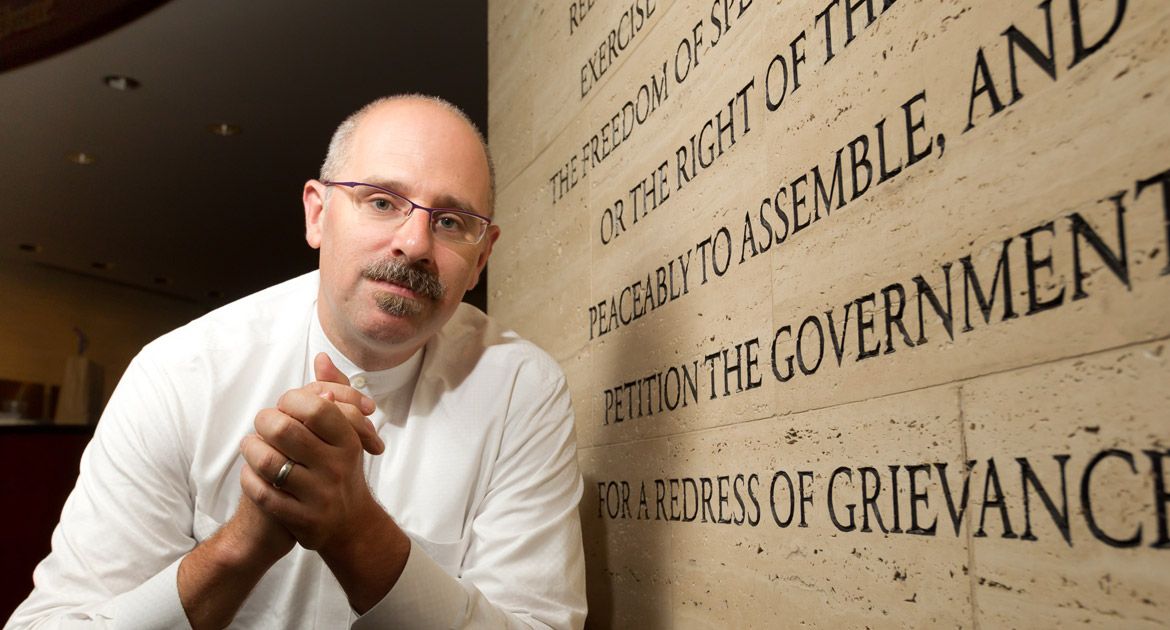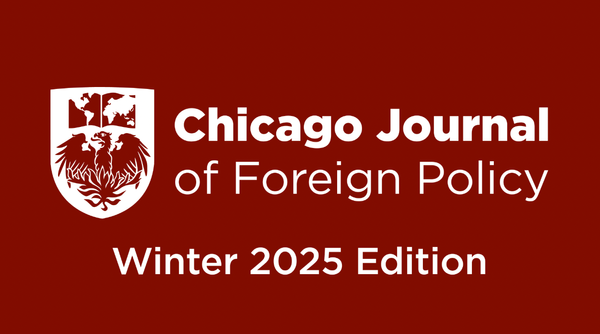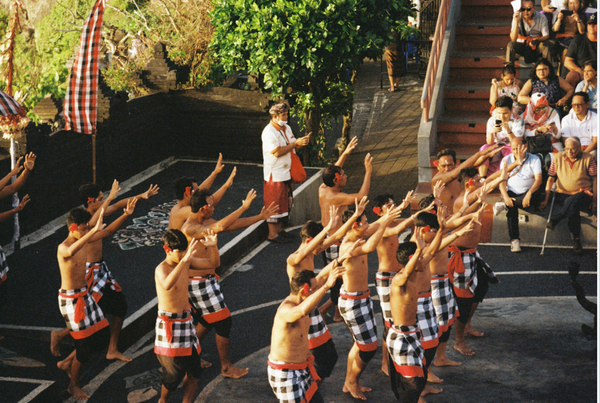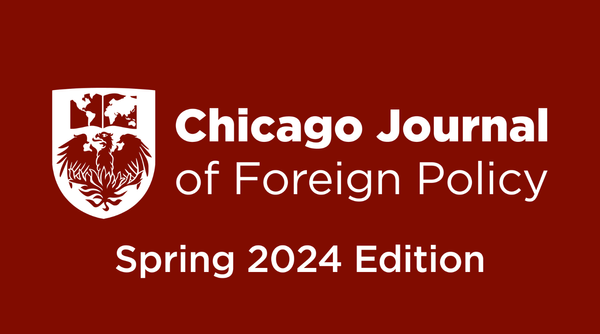Professor Spotlight: Tom Ginsburg

by THOMAS WEIL ’22
Thomas B. Ginsburg, JD, PhD, is the Leo Spitz Professor of International Law and the Ludwig and Hilde Wolf Research Scholar at the University of Chicago Law School and Professor of Political Science at the University of Chicago. He received his education at the University of California-Berkeley, with a BA in Asian Studies, followed by a JD and a PhD in Political Science, focused on Jurisprudence and Social Policy. Prior to joining the University of Chicago Law School as a Professor in 2008, he was a professor at the University of Illinois in Chicago. He has also had a varied career as legal advisor to the Iran-US Claims tribunal in the Hague, Netherlands and as a lecturer in the Law at Kyushu University Faculty of Law in Japan; he has also served in a variety of legal positions for the U.S. Department of State, in Thailand, and for the Supreme Court of Mongolia. He continues to serve as a legal advisor to a variety of international development agencies and foreign governments on legal and constitutional reform.
Professor Ginsburg has published widely across the fields of international and comparative law and political science. Recent works include How to Save a Constitutional Democracy (2018), with Aziz Z. Huq, The Endurance of National Constitutions (2009), and Judicial Reputation (2015). His next work, to be published in 2021, is Democracies and International Law: The Trials of Liberalism. He also co-directs the Comparative Constitutions Project, which is funded by the National Science Foundation, and seeks to gather and analyze the constitutions of all independent nation-states since 1789.
What follows is the approximate transcript of a recent interview with Profesor Ginsburg. He speaks about the state of his field, as well as some recent research.
What is a book you think everyone interested in studying international relations and politics should read?
I think I have a different one for politics and then international relations.
For politics, I think that everyone should read a book, I think it is from the late 1990s, called Seeing Like a State, by James Scott. It just really helps you understand our world, the geography and such, and how states have shaped it. I think it’s a very foundational book.
In international relations, there is an old classic that I think is worth reading which is called The Twenty Years’ Crisis; 1919-1939. It was a book by a realist scholar, E.H. Carr. He was responding to the attempt in the interwar order to try to constrain power with law. He rejects that as being naïve. It is really good to understand the sense of crisis that led to World War II, and then, of course, helps us understand the attempts thereafter to change this system.
What is the Comparative Constitutions Project, and why is it important?
I have always been interested in constitutions all over the world. When I got to the University of Illinois, I met a political scientist named Zachary Elkins, who also was interested in constitutions, though he was a Latin American scholar originally. I had done a lot of work on constitutions in my professional life before becoming an academic, so we asked ourselves: It’s a really interesting topic, why wouldn’t we try to create some systematic data? A lot of the arguments we made were sort of, “You are thinking of doing this? In this country it didn’t work.” So, very anecdotal. We wanted to bring some social science rigor to the study of constitutions and, of course, to do that you need data.
So the backbone of our project is a dataset, where we look at the contents of every constitution written by an independent state since 1789. Of course, new constitutions are always being written, so we are always updating. We are probably going to release our third round of data later this year. That is the core of it, a dataset.
Of course, there are a lot of collateral projects. There is a scholarly analysis of those things. There is the Constitute website, which is in the top 1% of websites globally in terms of numbers of hits. This is where anyone in the world can access what’s in national constitutions and compare them very easily. There is tremendous demand for that all over the world because constitutions are very important and, as we may talk about, they don’t last very long. There are many countries where “constitution-making” is going on. We are not trying to sell any particular model, we are just making data available to allow national public and constitutional drafters to do the best they can when they are working on their own constitutions.
What features make a constitution more enduring?
Zachary Elkins, James Melton, and I studied this in our 2009 book, The Endurance of National Conditions. We discovered in the course of doing that research that most constitutions don’t last very long. A lot of constitutions die in their first decade. We did a life expectancy model, a hazard model as it’s called in social science, and found that the predicted lifespan of a national constitution is only 19 years. Our particular interest was: Is there anything in the control of the drafters, anything in the process, that could make it last longer?
We discovered a correlation between endurance and constitutions that were flexible, inclusive, and specific. Those three factors, we think, predict endurance. Flexibility means it is relatively easy to change the constitution with new information or new challenges. Inclusive means it is drafted in a generally inclusive way–– the major interest groups in the society have come to the table and aren’t excluded. Finally, specific means that it has a good deal of detail, which is a little bit surprising for most Americans, but on average we find that constitutions that are more detailed tend to endure longer.
Can you speak to any changes in constitutional trends over time, whether that be in the initial drafting, redrafting or amending of constitutions? Are there any regional differences you can speak to?
That is one of the other interesting things we learned, and something you can only really learn when you take a social science approach and look at it as data.
In the 19th century, constitutions tend to be shorter, they tend to be focused on a Montesquieuian structure of government, with 3 branches and a relatively limited number of rights. What we have seen in the post-World War II period is a really dramatic increase in the number of rights in constitutions. There is also more institutional sophistication, including what we call “4th branch institutions” or “accountability institutions,” such as counter-corruption institutions and things like that–– more power to courts over time, also new ideas. That’s one of the interesting things about this, because conditions naturally reflect their era. We are seeing, for example, now a lot of discussion of nature; climate change is entering into constitutions, and categories of inclusion are expanding, for example, to LGBTQ individuals, so they do reflect their era.
They also reflect their region. You certainly see very big regional differences. Constitutions in South Asia and the Indian subcontinent tend to be very detailed and long, and they tend to be amended very often; they are quite flexible. They are very elaborate. You almost need to be a lawyer to read those! Constitutions in the Middle East are not like that at all, they are really short. Of course a lot of those states are monarchies. In a monarchical constitution, much of the content is about who gets to be king. They do not have a lot of rights and things like that. Latin America is the region with the most constitutions. It is the region with the oldest independent states and also a region with a lot of instability, which brings a lot of rewiring. Some of the most cutting edge trends are found in Latin America. The constitutions of Ecuador and Bolivia, for example, include rights granted to nature. This includes the right of “mother nature herself” in the Ecuadorian Constitution. This is a very cutting edge thing and a contribution to the global corpus of constitutions.
In The Endurance of National Constitutions, you mention endurance as being a feature of flexibility, inclusivity, and specificity. The US Constitution may fail all three of these standards. If there was any change you would suggest for the U.S. Constitution, what would it be?
First of all, these changes are not to be applied mechanically. It isn’t the case that, if we made the U.S. Constitution more specific and flexible overnight, it would automatically endure more. But, we do note that the United States is highly exceptional, and that is, again, where the importance of social science knowledge comes in.
When I was young and there was a lot of constitutional rewriting going on at the end of the Cold War, a lot of American lawyers would just go out to foreign countries and say to make it like the U.S. Constitution. “Do not put too much detail in there, it should be very hard to amend.” It turns out that advice was wrong, which we would not have known without our project.
It is also the case that the U.S. Constitution is very old and possibly feeling its strain. There is a branch of constitutional theory, or a theory of constitutional interpretation I should say, of textualism, which is very dominant in the courts now. But, if you read the constitution literally, it creates, potentially, an extremely strong presidency, which I think is being tested by the 2020 election. It creates the potential for a dictatorship, I would say, which is a big problem. I would like to see us institutionalize fourth branch institutions, like many other countries have, so there is a system of accountability. Presidents would have to disclose their wealth before they came into office and after the left, there would be formal protections for investigations of wrongdoing, etc. All of these things would be possible if they were constitutionally protected, but they are not and, therefore, we have seen constitutional abuse in the last few years. The other thing is that we know is that, in American states, voting is controlled by non-partisan officials, so state partisan officials are not running elections. Elections tend to be becoming more competitive, so I hope to see that principle of neutral electoral administration, which is being sorely tested this year (and seems to be surviving the test), be constitutionalized.
You have worked as a legal advisor at the US-Iran Claims tribunal, as a legal assistant at the state department, as well as with constitutional and legal reform projects in over 20 countries on top of work at the Comparative Constitutions project. From one or more of these experiences do you have any legal or constitutional changes that you helped bring into being that you are proud of?
It is funny– I got my start in this before I went to graduate school. I got interested in it because I was young and was working for the Asian Foundation in San Francisco, and I got involved in the constitution-making process in Mongolia. A tiny country, well, a very large country without a lot of people, between Russia and China, who were trying to democratize.
It was a bunch of young people, not much older than me, who were trying to help their country. So, I went out there, and I thought the process was all very interesting and I got to know a bunch of people. That turned out to be a really successful project. I just recorded a message to the Mongolian Parliament congratulating them on the 30th anniversary of the revised Parliament. Their constitution has lasted 28 years, and Mongolia remains a democracy even though it is between Russia and China. I’m not saying that I had a massive amount to do with it, I think all of these things are always collective efforts. That is one where I think the right thing happened and it has been pretty enduring in pretty difficult circumstances.
I have worked in a lot of places doing a lot of different things. I was working in Afghanistan in the early 2000s, working on setting up a system for an independent judiciary. I have done work on constitutional processes in Kenya, and Fiji, and Thailand, lots of different places. It is hard to know how much influence these things have. But, I think, in some cases, being a good lawyer and reading draft constitutions with an eye to what might go wrong, which is really what lawyers do, does have an influence. It prevents certain mistakes from getting put into the constitutional text. It is a little bit harder for us to say, “You should adopt X institution in order to have Y outcome.” That is, of course, one part of the whole field of comparative politics, and one in which we do not have a lot of knowledge to be honest. It is easier to predict how things might go wrong than to predict what is going to go right and what is going to happen, because social institutions are not mechanical.
What are the biggest challenges facing constitutional democracies right now?
Well, obviously, populist leaders, who rely on misinformation are the #1 challenge, not just in the US but in many other countries. They are a major challenge and a major crisis. Social media is kind of a free-for-all zone that I think can be harnessed in really good and creative ways for democracy, but can also be used to undermine it. I think we are kind of struggling with what a modern democracy looks like and what political participation looks like in an era of social media. I think that is a general challenge to government systems.
We have to recognize there are a lot of bad actors who do not care about democracy and who do not particularly want it. That requires, at the end of the day, a major commitment on the part of citizens to the institutions which resolve political conflicts. And, I don’t know, that it is a resolvable challenge but definitely a very big challenge.
You are writing a paper on COVID-19 around the world. What is the intersection between international crises of this scale and the endurance of the constitution?
Obviously, there has been a long history of scholars worrying about emergencies, and how emergency powers can be used to undermine the democratic order. Carl Schmit, the very famous political theorist of Nazi Germany, identified sovereignty with whoever got to invoke the emergency. That person was the sovereign, or the head of the political system. Of course, that did not work out very well for Nazi Germany, but the theory was a powerful predictor.
When COVID-19 hit, we did have a lot of concern, and a lot of scholars were writing about how emergency powers would be used to consolidate power. In fact, what we saw was that strategy did not work very well. A lot of dictatorships showed their brittleness in the COVID-19 Era. In Belarus, for example, Alexander Lukashenko was a COVID-19 denier and now he is hanging on but his regime is definitely weakened through it. We have seen the rise of populists, like Bolsonaro in Brazil, who are COVID-19 deniers. In the long run I don’t think denial is a winning strategy, but it obviously has a lot of support here in the U.S. I don’t think it is helping those people to leverage power. At the end of the day, in that analysis, which is a paper I wrote with Professor Mila Versteeg at the University of Virginia, we think that COVID-19 has shown that checks and balances are alive and well in democratic systems and that, by and large, they work, we think. That is a little bit harder to say with confidence as the pandemic is still raging…
You have a new booking coming out, Democracies and International Law: The Trials of Liberalism. What can readers expect?
I gave something called the Lauterpacht Lectures at Cambridge about a year and a half ago, and I am just finishing up that book. It’s about democracies and international law. Are democracies different? Can international law do anything about our era of democratic backsliding? And, finally, where are we going, in terms of international law, given that there has been something of a democratic recession?
Basically, the answer is that I think that international law is particularly attractive for democracies. This is an old line of theory, which is basically called commitment theory where democracies can use international legal institutions to tie their own hands effectively. I show that there is something to that which is empirically right. Now that we are in an era of backsliding, democracies could cooperate to defend each other’s democratic integrity. That is working okay but not great. So, there are reasons why democracies are not able to muster international institutions very effectively.
Finally, where are we going? I talk about the rise of what I call “authoritarian international law,” particularly the rise of a very robust, resilient Chinese regime which has no interest in promoting democracy to be sure and rather has an interest in defending itself from democratization pressures. I think every international lawyer and international relations theory has to grapple with the implication of that. That is what I try to do in the book as well.





